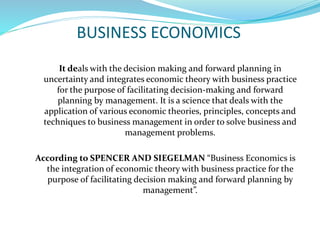Business and Economics New Possibilities and Challenges in the Modern Era
Business and Economics New Possibilities and Challenges in the Modern Era
Blog Article
Comprehending Financial Concepts for Better Company Decision-Making
In the facility landscape of contemporary business, a comprehensive understanding of financial concepts can substantially improve decision-making procedures. The application of these economic concepts usually discloses unanticipated challenges and opportunities that can redefine calculated approaches.
The Essentials of Economic Concept
Economic concept works as the structure for understanding exactly how individuals and organizations make choices in the presence of shortage. At its core, economic theory checks out the allocation of minimal resources to please limitless wants. This basic concept of scarcity requires compromises, compelling decision-makers to evaluate the benefits and expenses related to different options.
The two main branches of economic theory are microeconomics and macroeconomics. Microeconomics concentrates on private agents, such as firms and customers, analyzing their habits and interactions in certain markets. It stresses ideas like supply and demand, price flexibility, and market balance, which are important for understanding exactly how rates are established and exactly how resources are distributed.
On the other hand, macroeconomics examines the economic climate overall, resolving wider concerns such as rising cost of living, joblessness, and economic development. It offers understandings into systemic sensations that affect all financial representatives, assisting policymakers in crafting effective economic strategies.
Eventually, a solid grounding in financial concept is important for reliable company decision-making. By recognizing the principles of deficiency, trade-offs, and market characteristics, companies can better browse intricate settings and make educated options that improve their competitive benefit.
Key Economic Indicators
Secret economic indications act as essential tools for analyzing the wellness and instructions of an economy, giving beneficial understandings for service decision-making. These signs are measurable steps that show the economic performance and can be categorized into leading, delaying, and coincident indications.
Leading indicators, such as customer self-confidence indexes and stock exchange patterns, predict future financial activity, enabling services to expect adjustments out there. Delaying indications, like unemployment prices and business revenues, supply insights into the economic situation's past performance, assisting businesses to review lasting patterns. Coincident indications, such as GDP development and retail sales, change concurrently with the economic situation, supplying a real-time snapshot of financial problems.
Understanding these indications makes it possible for organizations to make informed decisions regarding financial investments, resource allocation, and tactical preparation. By carefully keeping an eye on these crucial financial indicators, companies can browse uncertainties and place themselves efficiently in the ever-changing financial landscape, inevitably boosting their decision-making processes and long-term success.

Market Frameworks and Characteristics
Recognizing market frameworks and dynamics is crucial for companies aiming to prosper in competitive atmospheres. Market structures, extensively categorized into ideal competitors, monopolistic competitors, oligopoly, and monopoly, significantly affect rates approaches, product differentiation, and affordable behavior. Each framework offers one-of-a-kind difficulties and possibilities that can determine a company's strategic instructions.
In perfect competitors, countless little companies complete, causing very little prices power and uniform products. Conversely, in monopolistic competition, companies distinguish their items, permitting some degree of rates power while still encountering competitors. Oligopolies, identified by a few dominant gamers, result in interdependent decision-making; firms have to meticulously think about competitors' responses to their activities. Syndicates exist when a solitary firm regulates you can try this out the market, resulting in maximum prices power yet usually bring in governing examination.
Recognizing these dynamics makes it possible for businesses to anticipate market patterns, adapt approaches, and optimize source allocation. Furthermore, acknowledging how external aspects like modern technology and guideline impact these structures can improve tactical preparation. By mastering market structures and characteristics, companies can make enlightened choices, ultimately improving their competitive position and driving lasting growth.
Consumer Habits Insights
Consumer behavior plays a critical function in forming service methods and outcomes. Comprehending just how consumers make buying choices, their choices, and the aspects influencing their actions can dramatically improve a company's capability to fulfill market demands. Key understandings into customer actions can be stemmed from click here for info examining demographics, psychographics, and behavioral patterns.
Demographic factors such as age, education, gender, and revenue level give a foundational understanding of target audience. Psychographics delve deeper, exploring consumers' way of lives, attitudes, and values, which can affect brand loyalty and product understanding. Behavioral insights, such as buying frequency and response to promotions, are vital for customizing marketing efforts.
Furthermore, outside aspects like best site financial conditions, social patterns, and technological advancements also affect consumer choices. For circumstances, throughout economic slumps, consumers may focus on essential products over luxury things, altering demand patterns.
Using Business Economics to Strategy
Insights gained from consumer habits contribute in developing reliable organization approaches. By leveraging financial concepts, services can much better understand market characteristics, optimize resource allocation, and improve competitive placing. Evaluating need flexibility, for instance, makes it possible for companies to readjust pricing techniques to make the most of earnings while remaining attractive to customers.
Additionally, comprehending market division allows organizations to tailor their offerings, ensuring they satisfy the specific demands and choices of diverse consumer groups. Business and Economics. This targeted method boosts customer satisfaction and promotes brand name loyalty

Integrating video game theory into critical planning additionally supplies insights into competitive habits, enabling companies to expect competing actions and design counter-strategies effectively.

Final Thought
In conclusion, a comprehensive understanding of economic concepts substantially enhances organization decision-making. By checking out market structures, reviewing consumer habits, and evaluating crucial economic signs, firms can create effective methods that straighten with market demands.
In the facility landscape of modern-day service, a detailed understanding of economic principles can dramatically improve decision-making processes.Leading signs, such as consumer confidence indexes and stock market patterns, predict future financial task, allowing businesses to expect adjustments in the market. By very closely keeping an eye on these crucial financial indicators, companies can navigate uncertainties and position themselves properly in the ever-changing economic landscape, inevitably improving their decision-making procedures and lasting success.
By leveraging financial principles, organizations can much better understand market characteristics, optimize resource allocation, and enhance affordable positioning.In final thought, an extensive understanding of economic principles substantially improves company decision-making.
Report this page